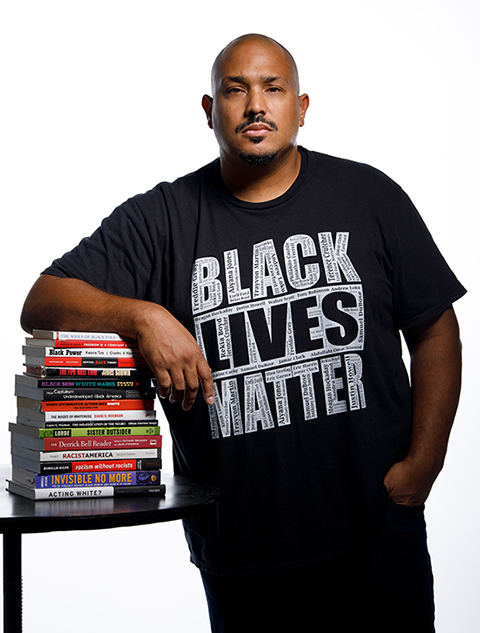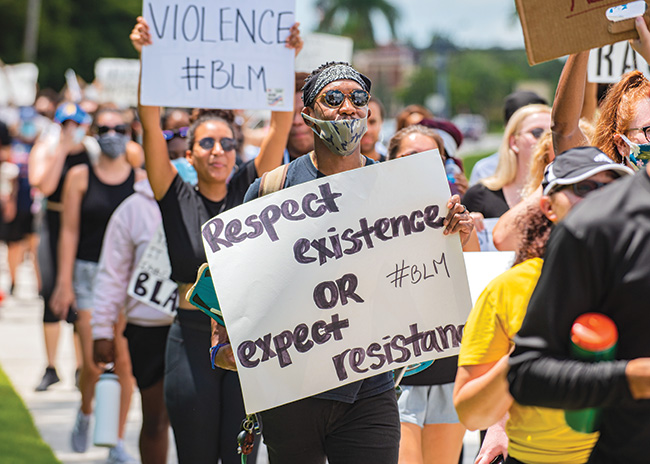He envisions fearless faculty fellows conducting significant research into the painful and uncomfortable topics surrounding race and ethnicity.
“All research on race and ethnicity is not critical race and ethnic studies,” he says. “The emphasis is on the critical part. It focuses on topics such as power, domination, oppression, intersectionality, privilege and resistance. It’s meant to disrupt problematic and dangerous narratives and elevate the concerns and interests of those groups and individuals that are historically and contemporarily marginalized, forgotten, given short shrift. I don’t want it to be watered down to be a can’t-we-all-just-get-along center.”

Thornhill is bringing noted scholars and experts to campus to address those issues through a speakers series. He’s planning to provide mentorship for students who will conduct research and have the opportunity to network with those visiting scholars. And he’s reaching into the community to engage and enlighten residents as well.
“At a minimum, we need to move beyond the conventional language of diversity, equity and inclusion,” he says. “If you intend to promote racial justice, and what you’re doing does not make at least some white people uncomfortable, then you need to question the impact of what you’re doing.”
Thornhill, along with several of the center’s faculty affiliates, are working toward introducing a critical race and ethnic studies course requirement that would ensure that all students receive exposure to topics such as systemic racism, immigration, settler colonialism, issues of gender and sexual orientation and environmental racism, among other important issues.
“It would shine a bright light at the university if done well, and we would be one of a few institutions in the country to have such a requirement,” he says. “It would be an amazing thing.”
Thornhill, an associate professor of sociology who teaches courses such as “White Racism,” “Social Stratification” and “Racism and Law Enforcement,” is looking “to create a culture of intellectual inquiry in racial justice activism for students interested in advancing racial equity in this area and beyond,” he says.
To do that, he thinks it’s necessary for people of all backgrounds to understand the complex and multitudinous causes of the racial divide that continues to roil this country.
“The United States was founded in a particular manner that involved the genocide of indigenous people,” he says. “Chattel slavery in the Americas afforded people of European extraction an opportunity to enrich themselves by dehumanizing others for hundreds of years, the effects of which continue to plague Black, Indigenous, people of color while providing those racialized as white with manifold unmerited advantages.”

While the center is operational now, it’s still in its organizational phase. Thornhill hopes to hold an official grand opening in the fall when more people have received COVID vaccines and it’s possible to have in-person gatherings so he can open the center’s doors to the public.
He knows he’ll need support – both in terms of influence and finances – from community members. Several well-known local influencers have already expressed backing for his efforts, including Hugh Starnes, a longtime circuit court judge who resigned his Southwest Florida post last year to help battle racial injustice, and Jim Nathan, the retired Lee Health CEO who was appointed last fall as co-dean of FGCU’s Marieb College of Health & Human Services.
“Ted has a lot of really good people (from FGCU) involved, but it’s important to bring in local support,” says Nathan, who adds that he has been involved in a lot of discussions about racism in the community over the past year or so and that it’s brought him a new awareness of the problem.
“We won’t get past systemic racism until white folks in a leadership capacity speak up and say this is wrong,” he says. “This is a tremendous opportunity to position FGCU regionally and nationally.”
Thornhill hopes the center will bring with it not just praise but progress.
“My vision is to advance racial justice,” he says.[/vc_column_text][vc_column_text]
To donate
To support FGCU’s Center for Critical Race and Ethnic Studies with a donation, contact Rochelle Jackson, assistant director of development, at [email protected] or 239-590-1099.[/vc_column_text]